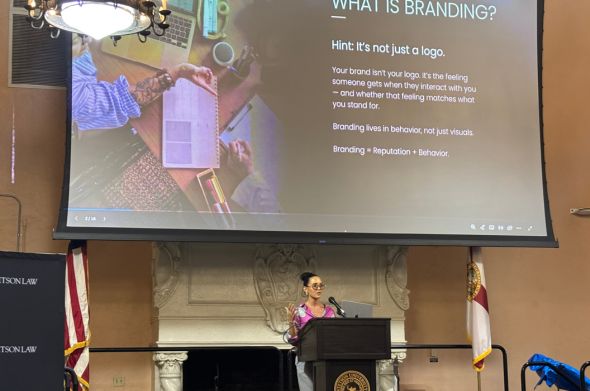Kaye Inns Speaker Offers Lessons in Values-Based Branding

What does branding have to do with fulfillment?
For legal professionals, more than one might expect.
Earlier this month, Law Professor Tim Kaye hosted a speaker who shared sharp insights about the important connection between personal values and professional identity.
The dinner event was part of the Stetson Inns program, the College’s fresh approach to helping law students develop confidence, understanding, and professional identity. The speaker was Bailey Martindale, founder of Branded Communication, who offered a thoughtful approach to brand-building tailored for legal professionals.
Introducing her, Kaye said the pressures of law school can be so overwhelming that success eclipses everything else.
“As a result, you forget about who you are and what your values were before you started,” Kaye said.
Building a professional identity early – one based on personal values – can help ensure a more fulfilling career in law, he said.
How values factor into brand
Through a series of examples and exercises, Martindale encouraged the students to think about what kind of lawyer they want to be – and how to express that to prospective clients. From aggressive litigators to passionate advocates for justice, there are plenty of options.
Those core characteristics, along with how one conducts him- or herself, form the roots of one’s brand – not, contrary to popular belief, a logo, billboard, or promo.
“Branding isn’t just visuals. Branding is reputation and behavior,” Martindale said. “The most important part of branding is really figuring out your values.”
Professional interactions, digital presence, aesthetic choices, and those with whom one associates send signals that help form a reputation, she added – so they ought to reflect the factors that motivated a lawyer to choose the legal profession in the first place.
Through an exercise she called a “Mini Brand Lab,” Martindale ask the students to choose words they would like to associate with their ethical core (integrity, justice, professionalism), the client experience they would like to create (transparency, compassion, speed), and personal drivers (excellence, legacy, community).
Having a clear personal values statement can help one maintain their professional ethical compass – and their brand – under pressure.
“Obviously, as you know, lawyers often find themselves in fairly stressful situations,” she said. “So how are you holding onto those values that are important to you in stressful situations?”
Aligning values with clientele
During a question-and-answer session that followed her presentation, a student asked what happens if justice is your core value, but a client is pushing you to win at all costs – ethically or otherwise.
“There are those lawyers who want to be known as ferocious lions who will do whatever it takes to win,” Martindale said. “There’s nothing wrong with that.”
If a client’s expectations go against your own ethos, however, it might be time for a difficult conversation.
“That is when I encourage you to fire that client,” Martindale said. “I know that is a scary decision.”
And if the message you’re sending seems to be bringing in clients whose goals do not align with your values, Martindale said, “that is probably telling you it’s time for a rebrand.”
Immersive learning in a relaxed setting
Stetson Law’s award-winning Inns program aims to create a low-pressure environment where first-year students are introduced to everything from essential legal knowledge to practical tools like marketing. The goal is to encourage them to begin to develop their authentic professional identity before the pressures of law school and the legal profession set in – and to make career choices accordingly.
The program consists of smaller groups of first-year law students led by a “Bencher,” or professor – in this case, Professor Kaye – and mentored by 2Ls and 3Ls. Within these smaller groups, Benchers aim to cultivate a sense of belonging and a support system among the students while giving them a chance to meet and hear real-world insights from working professionals in the legal world and beyond.
Learn more about the Stetson Inns.
Post date: Oct. 20, 2025
Media contact: Kate Bradshaw
[email protected] | 727-430-1580